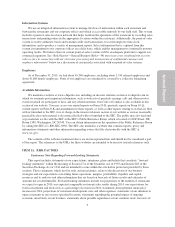Chipotle 2013 Annual Report Download - page 20
Download and view the complete annual report
Please find page 20 of the 2013 Chipotle annual report below. You can navigate through the pages in the report by either clicking on the pages listed below, or by using the keyword search tool below to find specific information within the annual report.
included in Item 8. “Financial Statements and Supplementary Data.” Unauthorized workers may subject us to
fines or penalties, and if any of our workers are found to be unauthorized our business may be disrupted as we try
to replace lost workers with additional qualified employees. On the other hand, in the event we wrongfully reject
work authorization documents, or if our compliance procedures are found to have a disparate impact on a
protected class such as a racial minority or based on the citizenship status of applicants, we could be found to be
in violation of anti-discrimination laws. We could experience adverse publicity arising from enforcement activity
related to work authorization compliance, anti-discrimination compliance, or both, that negatively impacts our
brand and may make it more difficult to hire and keep qualified employees. Moreover, in addition to the criminal
and civil investigations mentioned above under “Risks Related to Operating in the Restaurant Industry—Our
business could be adversely affected by increased labor costs or difficulties in finding the right employees for our
restaurants and the right field leaders,” the office of the U.S. Attorney for the District of Columbia and the U.S.
Securities and Exchange Commission have informed us that they are conducting parallel investigations into
possible criminal and civil securities law violations relating to our employee work authorization compliance and
related disclosures and statements as well. All of the foregoing investigations will continue to be expensive and
distracting, and could subject us to fines, reputational damage, and other liabilities that could be significant.
Additionally, while we do not currently have any unionized employees, union organizers have engaged in
efforts to organize employees of other restaurant companies. If a significant portion of our employees were to
become union organized, our labor costs could increase and our efforts to maintain a culture appealing only to
top performing employees could be impaired. Potential changes in labor laws, including the possible passage of
legislation designed to make it easier for employees to unionize, could increase the likelihood of some or all of
our employees being subjected to greater organized labor influence, and could have an adverse effect on our
business and financial results by imposing requirements that could potentially increase our costs, reduce our
flexibility and impact our employee culture.
Americans with Disabilities Act and Similar State Laws
We are subject to the U.S. Americans with Disabilities Act, or ADA, and similar state laws that give civil
rights protections to individuals with disabilities in the context of employment, public accommodations and other
areas. We have incurred substantial legal fees in connection with ADA-related complaints in the past, and we
may in the future have to modify restaurants, for example by adding access ramps or redesigning certain
architectural features, to provide service to or make reasonable accommodations for disabled persons under these
laws. The expenses associated with these modifications, or any damages, legal fees and costs associated with
litigating or resolving claims under the ADA or similar state laws, could be material.
Nutrition and Food Regulation
In recent years, there has been an increased legislative, regulatory and consumer focus at the federal, state
and municipal levels on the food industry including nutrition and advertising practices. Restaurants operating in
the quick-service and fast-casual segments have been a particular focus. For example, the State of California,
New York City and a number of other jurisdictions around the U.S. have adopted regulations requiring that chain
restaurants include calorie information on their menu boards or make other nutritional information available. The
U.S. health care reform law included nation-wide menu labeling and nutrition disclosure requirements as well,
and our restaurants will be covered by these national requirements when they go into effect, which may be as
early as 2014. Initiatives in the area of nutrition disclosure or advertising, such as requirements to provide
information about the nutritional content of our food, may increase our expenses or slow customers as they move
through the line, decreasing our throughput. These initiatives may also change customer buying habits in a way
that adversely impacts our sales.
Local Licensure, Zoning and Other Regulation
Each of our restaurants is also subject to state and local licensing and regulation by health, alcoholic
beverage, sanitation, food and workplace safety and other agencies. We may experience material difficulties or
failures in obtaining the necessary licenses or approvals for new restaurants, which could delay planned
18
Annual Report
























